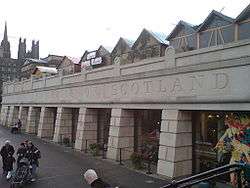Committees of the Scottish Parliament

The Scottish Parliament has a number of committees, with small numbers of Members appointed to deal with particular topics or issues.
Much of the work of the Scottish Parliament is done in committee. The role of committees is stronger in the Scottish Parliament than in other parliamentary systems, partly as a means of strengthening the role of backbenchers in their scrutiny of the Government[1] and partly to compensate for the fact that the parliament is unicameral (there is no revising chamber).
The principal role of committees in the Scottish Parliament is to conduct inquiries, scrutinise legislation and hold the government to account.[2] Committee meetings take place in the Parliament's committee rooms all day Tuesday and Wednesday morning when Parliament is sitting. Committees can also meet at other locations throughout Scotland.[3]
Membership of the committees reflects the balance of parties across Parliament.[2] There are different types of committee, with their functions set out in different ways.
The membership of the committees in August 2011 is shown below. All committees also have substitute members (not shown).
Mandatory Committees
Mandatory Committees are committees which are set down under the Scottish Parliament's standing orders, which govern their remits and proceedings. The current Mandatory Committees of the Scottish Parliament are:[2]
Culture, Tourism, Europe and External Relations
Delegated Powers and Law Reform Committee
Equalities and Human Rights
Finance and Constitution
Public Audit and Post-legislative Scrutiny
The remit of the committee, as published by the Parliament, is to consider and report on:
- any accounts laid before the Parliament
- any report laid before or made to the Parliament by the Auditor General for Scotland
- any other document laid before the Parliament concerning financial control, accounting and auditing in relation to public expenditure
- post-legislative scrutiny
Public Petitions
The remit of the Committee is to decide what action should be taken on admissible public petitions. The Committee is also responsible for deciding, in cases of dispute, whether a public petition is admissible.
On 16 June 2009 the Committee reported on its 'Inquiry into the public petitions process'[4] issued to reflect 10 years of operation, which included an evaluation of the pioneering e-Petitioner online petitioning system.
Standards, Procedures and Public Appointments
Subject Committees
Subject Committees are established at the beginning of each parliamentary session, and again the balance of members on each committee reflects the balance of parties across Parliament. Typically each committee corresponds with one (or more) of the departments (or ministries) of the Scottish Government. The current Subject Committees are:[2]
Economy, Jobs and Fair Work
Education and Skills
Environment, Climate Change and Land Reform
Health and Sport
Justice
Justice Sub-committee on Policing
Local Government and Communities
Rural Economy and Connectivity
Social Security
Conveners’ Group
The Conveners’ Group is a special committee of the Scottish Parliament chaired by either the Presiding Officer of the Scottish Parliament or one of the Deputy Presiding Officers. Its main responsibilities are involved in the administration of Committee expenses and certain other activities.
Previous Committees
Private Bill Committees
A further type of committee is normally set up to scrutinise private bills submitted to the Scottish Parliament by an outside party or promoter who is not a member of the Scottish Parliament or Scottish Government. Private bills normally relate to large-scale development projects such as infrastructure projects that require the use of land or property.[5] Private Bill Committees have been set up to consider legislation on issues such as the development of the Edinburgh Tram Network, the Glasgow Airport Rail Link, the Airdrie-Bathgate Rail Link and extensions to the National Gallery of Scotland.[6]
Burrell Collection (Lending and Borrowing) (Scotland) Bill Committee
- Joan McAlpine (Convener)
- Jackson Carlaw (Deputy Convener)
- Gordon MacDonald
- Mark Griffin
City of Edinburgh Council (Leith Links and Surplus Fire Fund) (Scotland) Bill Committee
- Anne McTaggart (Convener)
- Bruce Crawford
- John Lamont
- Sandra White
City of Edinburgh Council (Portobello Park) Bill Committee
- Siobhan McMahon (Convener)
- James Dornan (Deputy Convener)
- Alison McInnes
- Fiona McLeod
Justice Sub-Committee on Policing - Implementation of Police and Fire Reform (Scotland) Act
- Christine Grahame (Convener)
- Alison McInnes (Deputy Convener)
- Graeme Pearson
- John Finnie
- Kevin Stewart
- Margaret Mitchell
Subject Committees
Referendum (Scotland) Bill Committee
- Bruce Crawford (Convener)
- Annabel Goldie
- Annabelle Ewing
- Linda Fabiani
- Patrick Harvie
- Rob Gibson
- Lewis Macdonald
- Stewart Maxwell
- Tavish Scott
- Drew Smith
- Stuart McMillan
Welfare Reform Committee
- Michael McMahon (Convener)
- Jamie Hepburn (Deputy Convener)
- Alex Johnstone
- Ken Macintosh
- Annabelle Ewing
- Kevin Stewart
- Linda Fabiani
References
- ↑ Dardanelli (2005) p185
- 1 2 3 4 "Committees - Parliamentary Business: Scottish Parliament". Scottish Parliament. Retrieved 2015-04-26.
- ↑ "Finance Committee to meet in Perth". Scottish Parliament Information Centre (SPICe). Archived from the original on 21 March 2005. Retrieved 2006-11-22.
- ↑ Inquiry into the public petitions process Scottish Parliament Paper 300, 3rd Report, 2009 (Session 3) (PU/S3/09/R3) (Accessed 16.06.2009)
- ↑ "Private Bills". Scottish Parliament Information Centre (SPICe). Archived from the original on 5 December 2006. Retrieved 2006-11-22.
- ↑ "Private Bill Committees". Scottish Parliament Information Centre (SPICe). Archived from the original on 5 December 2006. Retrieved 2006-11-22.
External links
- Committees of the Scottish Parliament, at the official parliamentary website